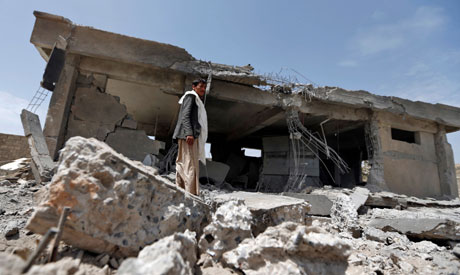Date: Wednesday, 25 April 2018

Al-Sammad is the highest-ranking Houthi official to be killed by the Saudi-led coalition since it started its operations in the Arab world's poorest state in March 2015. He was second only in seniority to the Houthi's overall leader Abdel Malek Al-Houthi, who is still residing in Yemen.
According to Saba News Agency, which is controlled by the Houthi rebels, Al-Sammad will be replaced by Mahdi Mohamed Hussein, another supreme council member.
AFP reported that Al-Sammad is the second name on a list of 40 Houthi figures that Saudi Arabia has announced as seeking to target, offering millions of dollars in rewards for anyone providing information.
Following the death of Al-Sammad, the Houthi's declared their intention to avenge his killing; they now seem likely to renew their battle against the Saudi-led coalition, meaning the chances of a swift end to the conflict are slim.
The chances of peace are further undermined by the ongoing programme of air-raids by the Saud-led coaltion that have caused large-scale loss of civilian life. While the Saudi's claim their air-strikes are aimed at killing Houthi leaders, the civilian casualties that result have provoked anger within Yemen.
On Sunday night, the day before the killing of Al-Sammad, an air-raid took place on a wedding in Bani Qa'is District in Hajjah Governorate.
According to local emergency services, this attack resulted in the deaths of 40 people, including women and children, with many more injured. The Houthis who control the district blamed the attack on the Arab coalition led by Saudi Arabia.
The head of Al-Jumhouri Hospital in the Houthi-controlled province told Reuters by telephone that "since 10 pm the hospital had received 40 bodies, most of them shredded to pieces, and that 46 people had been injured, including 30 children, many of whom are severely injured."
According to the Houthis' Al-Masirah TV, three children had to undergo amputations.
Saba reported that the dead and wounded numbered 88 in total, reporting this news under the heading: "A New Saudi War Crime".
This is not the first time that an air-raid has hit a wedding in Yemen; on September 28, 2015, a wedding taking place in the coastal city of Mocha was bombed, resulting in the deaths of 131 civilians.
In October 2016, an air raid was conducted on a hall hosting a funeral, killing 140 people.
Fragmentation of camps
Since 2015, the Arab military coalition, led by Saudi Arabia, has been fighting Houthi forces, who have been in control of Sana'a, along with most of what was known as the Republic of North Yemen.
Riyadh and its Gulf allies accuse Iran of supporting the Zaydi Shiite Houthis. It is important to note that Zaydi Shiites account for more than half of Yemen's population.
As a result of the war, which has raged since March 2015, the country has reached the brink of famine. Most children (more than two-thirds of children, according to UNICEF) suffer from malnutrition, and thousands have already died due to food shortages.
Moreover, according to the UN's World Food Programme (WFP) 18 million Yemenis (out of a population of 23 million) are in dire need to urgent humanitarian assistance.
Any chance of a negotiated settlement that would end the suffering have receded in recent months as the two main camps on the ground found themselves fragmenting.
At the end of last year, the Houthi's alliance with the forces of late president Ali Abdel-Saleh fell apart when the Sana'a-based leader hinted at his willingness to do a deal with Saudi Arabia. He was killed in the following clashes with Houthi forces.
Earlier this year, the two main pro-Saudi camps clashed around Aden, with the Southern Movement taking control of Aden and ejecting the Al-Islah Party, which is the Yemen branch of the Muslim Brotherhood.
This fragmentation of both camps will make any potential negotiations much more difficult to arrange.
On a wider scale, the split between the Houthi's and the forces of Abdel-Saleh meant that the Houthi militias would face the Saudi-led coalition alone, without any allies from within Yemen.
As such, the Houthis alone have been launching missiles into Saudi Arabia, which said on Monday that its air defence system has intercepted another Houthi missile.
Riyadh has accused its Iranian rival of providing the Houthis with weapons, but Tehran denies such claims.
The terrorist elements
Further complicating matters is the factor of "jihadist" forces across Yemen who are fighting against all the other camps simultaneously, including both the Houthi forces and their Gulf-backed enemies in the south.
On Sunday, AFP news agency reported heavy fighting between "jihadist" militants and forces loyal to Hadi, who control the central city of Taiz, the third largest city in Yemen. The clashes errupted following the killing of an International Committee of the Red Cross (ICRC) staff member, which Hadi's forces have blamed on the jihadists.
The clashes resulted in the deaths of five government soldiers and the wounding of 19 others, but there is no confirmed information about the jihadists' losses and casualties.
For the past three years Taiz has been going through a difficult situation, being controlled by government forces and besieged by Houthi militias. The involvement of jihadist groups further fragments and complicates the picture, increasing the chances for clashes in various locations across Yemen.
As the Yemen conflict begins its fourth year, the prospects for a solution are few, bearing in mind the ongoing airstrikes, the fragmentation of forces and the complicating factor of terrorist groups with their own agendas.
It seems Yemen is moving further away from peace, with the prospects for a wide-scale famine looming closer – described by the United Nations as worse than ever.